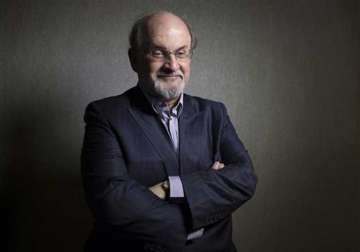Vermont: Author Salman Rushdie, who lived for years under a death threat after his 1988 book “The Satanic Verses” drew the wrath of Iranian religious leaders, said Wednesday the right to free speech is absolute or else it isn't free.
Following a speech at the University of Vermont in Burlington, Rushdie was asked about the killings last week of 12 people at the Paris satirical magazine Charlie Hebdo. He said he was angered that, in the aftermath of the shootings by Islamic extremists, some from both the left and the right began to vilify the victims.
“The French satirical tradition has always been very pointed and very harsh, and still is, you know,” Rushdie said. “The thing that I really resent is the way in which these, our dead comrades ... who died using the same implement that I use, which is a pen or pencil, have been almost immediately vilified and called racists and I don't know what else.”
He said some believe speech should be free, but it shouldn't upset anyone or go too far.
“Both John F. Kennedy and Nelson Mandela use the same three-word phrase which in my mind says it all, which is, ‘Freedom is Indivisible,”' he said. “You can't slice it up, otherwise it ceases to be freedom. You can dislike Charlie Hedbo. ... But the fact that you dislike them has nothing to do with their right to speak.”
Rushdie's visit to the University of Vermont to discuss his writing of his book “Haroun and the Sea of Stories” was planned months ago. But his visit was given urgency by the killings in France by two Islamic extremists who were upset with the writings and art used by Charlie Hedbo.
The publication of Rushie's 1988 book “The Satanic Verses” drew the wrath of Iranian religious leaders for its depiction of the Prophet Muhammad. They issued a religious edict in 1989 calling for his death. The edict was officially lifted in 1998. He now lives in New York.
Nevertheless, security at the Vermont event was heavy; security personnel searched bags and looked under heavy winter coats.
Rushdie didn't address directly his years living under the threat of death, but he spoke of how the writings of authors who offend powerful people frequently outlive the criticism—even if the artists themselves don't survive.
He said the role of art is to go to the edge, open the universe and expand minds. But doing that is not easy, and artists can't occupy a middle ground.
“And so artists who go to that edge and push outwards often find very powerful forces pushing back. They find the forces of silence opposing the forces of speech. The forces of censorship against the forces of utterance,” he said. “At that boundary is that push-and-pull between more and less. And that push and pull can be very dangerous to the artist. And many artists have suffered terribly for that.”
Latest World News
